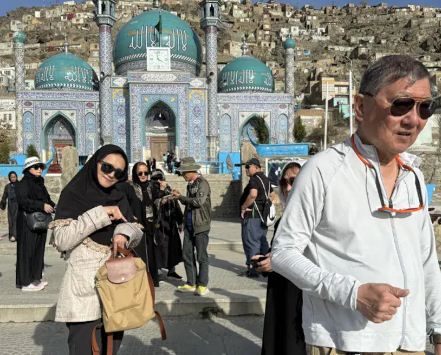The UNHRC special rapporteur said the UN is concerned about “increasingly restrictive media climate and the arbitrary arrest of journalists.”…reports Asian Lite News
The United Nations Human Rights Council’s Special Rapporteur for Afghanistan, Richard Bennett, has expressed concern about the surge in restrictions on media in Afghanistan, according to TOLOnews.
On World Press Freedom Day, Bennett emphasised the importance of media in Afghanistan and urged for worldwide support for journalists.
The UN Special Rapporteur for Afghanistan remarked, “Journalism in Afghanistan is critical. I’m concerned about the increasingly restrictive media climate and the arbitrary arrest of journalists. I encourage the international community to help Afghan journalists.”
Karen B. Decker, American Charge d’Affaires to Afghanistan emphasised the significance of hearing journalists’ voices in separate messages.
Karen Decker said: “Afghan journalists are Afghan voices amplifying Afghan messages. They need to be heard. This World Press Freedom Day, we stand united in protecting press freedom worldwide.”
Citing Mohammad Raqib Fayaz, a journalist, TOLOnews said, “The media play a very important role in securing governmental reforms, maintaining order, and eradicating societal irregularities.”
“Meetings of consonance between journalists and officials should be created, and in due time, officials should provide information to journalists,” another journalist said.
This comes as Afghanistan has dropped 26 places in Reporters Without Borders’ Press Freedom Index owing to journalist fatalities and arrests, placing 178th overall.
Pakistan
While observing World Press Freedom Day, media bodies voiced concerns over the state of free media in Pakistan, with a focus particularly on mainstream media and social media restrictions during election days, Pakistan-based Dawn reported.
The Association of Electronic Media Editors and News Directors (AEMEND) has committed to continue the constitutional and legal struggle for freedom of expression in Pakistan and face unfavourable circumstances head-on.
In a statement, AEMEND said that journalists and media outlets in Pakistan face severe challenges, as state and non-state actors have been placing restrictions on television programmes, shutting down broadcasts, pressing for the termination of journalists, creating unnecessary pressures, and making illegal demands.
AEMEND said, “Such tactics are increasing by the day,” adding, “Character assassination of journalists, especially women journalists, is part of this campaign, and political party workers are also part of such malicious campaigns,” according to Dawn report.
It said these tactics are aimed to suppress journalists and restrict freedom of expression. AEMEND further said that illegal restrictions on social media, sending notices to journalists and other institutions, shutting down mobile phone and internet services on important occasions, restricting the coverage of targeted political and non-political activities and the issuance of illegal notices by PEMRA are actions taken to deprive people of their right to information, which it stressed is against the spirit of democratic societies.
In its South Asia Press Freedom Report, the International Federation of Journalists (IFJ) said that four journalists were murdered and women journalists in Pakistan faced harassment online and offline.
The IFJ further said, “Pakistan’s women journalists faced similar harassment both online and offline; they are in a minority, and their voices are unheard,” Dawn reported.
Meanwhile, the Freedom Network has released its annual Pakistan Freedom of Expression and Media Report 2024 titled as “Erosion of free speech: The silencing of citizens, political parties, and media.”
In the report, it highlighted Pakistan’s socio-political-legal and media industry-related factors and developments affecting the freedom of expression by the people and media, according to Dawn report.
On May 3, Human Rights Commission of Pakistan called on the government to ensure fair treatment to journalists and protect them, stated a press release from the organisation.
In a statement, HRCP demanded that the government should ensure fair and timely remuneration for journalists and media workers, develop mechanisms to protect against attacks, hold accountable those responsible for their illegal detention, and protect the right to freedom of expression.
the HRCP raised concerns over recent threats given to Hamid Mir for advocating free speech. The same statement claimed that the state and law enforcement agencies have taken no steps to hold the perpetrators accountable.
The HRCP demanded that “such oppressive and heinous tactics must stop. Freedom of the press, which is considered the fourth pillar of the state, is indispensable for the stability of a healthy democracy.
It said that the state must demonstrate its commitment to protecting the freedom of the press, and ensure the rights to life, job security, freedom of expression, and fair wages for all journalists and media workers, especially dissidents. (ANI)
Anti-Taliban protests enter second day in Badakhshan
The anti-Taliban protests in Afghanistan’s Badakhshan’s Darayim district entered its second day on Saturday as the residents expressed concern over the detention of these five community leaders, according to Khaama Press.
The residents claim that the Taliban took five community leaders in order to discuss the demands put forth by protesters, however now their fate remains unknown.
Anti-Taliban protests in Darayim, Badakhshan, began on Friday, May 3; according to Badakhshan villagers, after the initial protests, Taliban fighters resorted to firing at the people to quell them, killing at least one person. Protesters reported that after this individual’s death, Darayim residents continued their march, according to Khaama Press.
According to the Khaama Press report, demonstrations started after Taliban fighters invaded the housing area with the intention of burning poppy fields but instead “molested women in their homes.”
Local Taliban authorities confirmed that one person was killed in these protests.
Meanwhile, several videos circulating online showcased protesters in Badakhshan saying they do not want the Taliban’s “Islamic Emirate” in this province.
Furthermore, demonstrators in Darayim, Badakhshan, claim that Taliban members harass and threaten the residents of this district, street by street and home by house.
According to one demonstrator, the Taliban violate the “honour, religion, and privacy” of the people.
These demonstrators accuse the Taliban of destroying people’s houses and inflicting oppression and injustice on them.
As of now, Taliban leaders in Kabul have not responded to the demonstrators in Badakhshan’s Darayim area. (ANI)
ALSO READ: Pakistan, Iran, China Plan Trilateral Defence Talks

